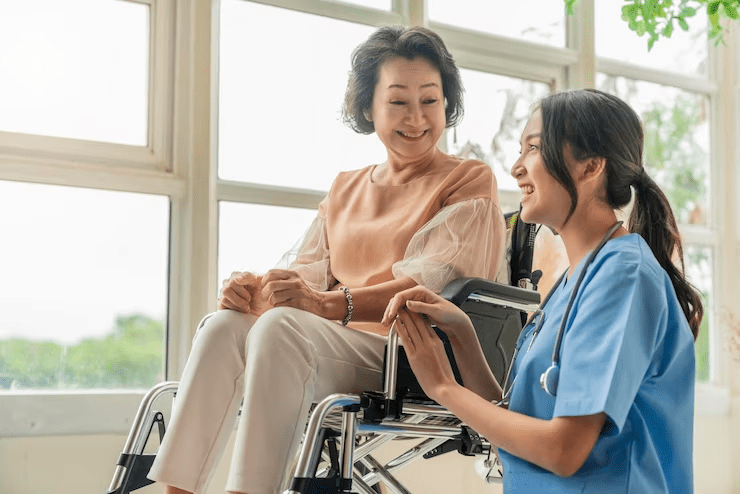When it comes to the comprehensive care of people who are unable to provide for themselves, professional caregivers contribute a lot. They are adept and compassionate individuals, offering thorough and regular help in routine activities and medical care. They are employed for the elderly, people with disabilities, or individuals recovering from chronic illnesses, providing complete and extensive assistance in maintaining health and performing necessary functions.
The role of caregivers is crucial in the health and daily living of people under their care, as the subjects are totally dependent on these professionals. Hence it is imperative for a caregiver to be professional and skilled in their work and must have a comprehensive understanding of what the duties of a professional caregiver entail. Only by being focused and attentive to the needs of their care recipients and by applying standard practices can a caregiver provide the holistic and necessary nurturing their noble profession is meant to provide. Concerning the duties of a professional caregiver, it is also necessary to be mindful that providing physical care is not the only element of a caregiver’s role, as they are responsible for offering emotional and mental well-being as well. In this blog, we will explore the critical aspects of a caregiver’s function and will also examine what this noble profession asks from these professionals. So let’s begin:
Duties of a Professional Caregiver
Personal Care Assistance
When it comes to the responsibilities of caregivers, the first and foremost is providing assistance with the personal care needs of their clients. Personal care is extensive and can include helping with bathing, dressing, grooming, and toileting. This care is utilized by individuals who have difficulty performing these tasks independently due to age, illness, or physical limitations. A caregiver’s role is to perform all these tasks with compassion and attentiveness, taking full responsibility for offering thorough hygiene and other needs. Further, maintaining the dignity and privacy of the clients while providing this support is of utmost importance as well.
Medication Management
Medical care is another important and often hired element of these professionals’ duties. While performing this role, it is the duty of the professional to ensure that clients take their medications as prescribed and keep a stringent check on the regularity of this medication routine. To be better able to perform this duty, it is required for the caregivers to be well-versed in the medications their clients are taking, including dosage and potential side effects. Medication management also involves keeping accurate records of medication schedules and corresponding with healthcare professionals or family members if any need arises.
Read More: The Challenges Faced by Caregivers Caring for the Elderly
Mobility and Exercise Support
Mobility and exercise support comes into the responsibility of caregivers when they attend to care beneficiaries who have mobility issues or are recovering from injuries. In this situation, it falls on the shoulders of caregivers to assist these people in routine movements and provide the necessary care for the recovery of their subjects by helping them with mobility exercises and physical therapy routines. These responsibilities include helping clients with walking, using mobility aids, or following prescribed exercise programs to improve strength and flexibility.
Meal Preparation and Nutrition
As these professionals provide a holistic well-being ritual to their recipients, taking care of individuals’ dietary requirements also entails the duties of a professional caregiver. This responsibility includes Preparing nutritious meals that align with the client’s dietary needs and restrictions. While performing this task, it is required by the caregiver to be mindful of any allergies or dietary preferences of the client, ensuring they receive balanced and healthy meals. Adequate hydration is also crucial, and caregivers must encourage their clients to drink enough fluids throughout the day.
Companionship and Emotional Support
The duties of a professional caregiver extend beyond being considerate of the client’s physical needs. Their comprehensive care system also incorporates invaluable emotional support and companionship to their clients. Loneliness and social isolation can have detrimental effects on a person’s well-being, especially for seniors. But with caregivers’ thorough support and fruitful associations, the client benefits from positive social interactions reducing the harmful impacts of social isolation. In this role, a caregiver engages in meaningful conversations, participates in activities, and fosters a sense of companionship, contributing to the overall mental and emotional health of their clients.
Monitoring Health Conditions
Besides medication management, the medical care role of these professionals also includes monitoring the clients’ health conditions and reporting any changes to relevant healthcare professionals or family members. In this function, caregivers may track vital signs, record symptoms, and communicate concerns promptly, ensuring that any health issues are addressed in a timely and effective manner.
Read More: Need a Caregiver for Your Mother? 8 Things to Consider
Household Management
Being a responsible and diligent caregiver also involves taking charge of basic household management of clients who live independently or with their families. In this position, professionals are tasked with light housekeeping, laundry, and grocery shopping, ensuring that the living environment is safe, clean, and organized.
Respite Care
Sometimes caregivers are hired to provide respite care services only, which includes allowing family members who act as primary caregivers to take breaks and tend to their personal needs. This not only helps to offer the primary caregiver a necessary and much-needed break but also ensures that any negligence can be prevented in the patient’s well-being, given the risk of caregiver burnout of the primary care provider.
Communication and Coordination
Effective communication is key in the role of a professional caregiver. They must keep families informed about the client’s condition, progress, and any concerns that may arise. Additionally, they may collaborate with other healthcare professionals, such as doctors, nurses, and therapists, to ensure the best possible care for their clients.
Observing Changes in Behavior
Being compassionate, responsive, and understanding of the client’s needs are crucial aspects of a caregiver’s character. They are also trained to observe changes in their clients’ behavior or moods. This learning is vital to understand the mental and physical needs of clients, indicating underlying health issues or emotional distress. Moreover, being proactive in such changes allows for early intervention and better outcomes.
Read More: Differences Between Companionship and Friendship
The Bottom Line
Professional caregivers are an essential part of people’s life who are in need of social, mental, or physical assistance. With their dedication, compassion, and diverse skill set, they provide essential services that contribute to the holistic and fruitful well-being of their clients. As the demand for caregiving services continues to grow, recognizing and appreciating the invaluable contributions of these caregivers becomes ever more important in building a compassionate and caring society.





